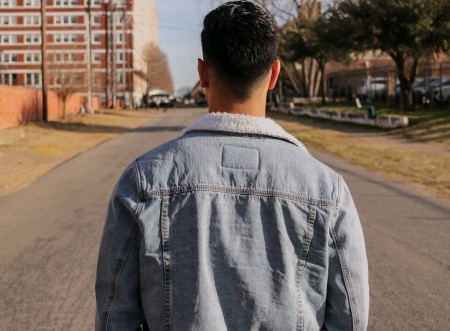I think a lot. My kids give me plenty of topics to ponder: dating, clothes, impending puberty. One topic will remain on my mind for a very long time- how will having autism affect Julian as an adult? Will he need help with managing daily life, or will he be able to do everything on his own? He’s not great yet at self-advocacy, so how will this affect him when he needs his ADHD medications adjusted? Will he find someone that loves him?
Sometimes these thoughts keep me up at night. I have to remind myself that we can only move so fast in life and that right now, I am just trying to get Julian through the 7th grade. He’s currently fine on his meds and otherwise, has friends and is growing- he is finally over 5 feet tall. I think he will be as tall as me soon. (I am 5’2″, but to him, this is EVERYTHING)

Letting Go of Your Baby Bird
Watching our kids grow up and move into their own lives is hard. My mom actually cried when I moved out. I often joke about being delighted when the kids are gone, but I will most likely be a sobbing mess when those days come. In Julian’s case, I have the feeling that I will be happy, but a new set of worries will begin. I won’t be able to help him as much as I can now. I am trying to teach him to speak up for himself in all aspects. He’s quiet and I worry that may hold him back or cause issues.
What about college? Julian has decided that he doesn’t want to go to college (see My Kids and College) and this is okay. For those whose kids want to go to college, remember that this is a time of growth and transition for everyone. Your child is about to be around a lot more people than they were around in high school, which equals more noise, smells, etc. This in itself can be an issue. The buildings are bigger, brighter, and further apart. This is something else to get used to.
College schedules are different. Making friends in college can be either difficult or easy, depending on your personality. In this case, it may be a bit more complicated. You, as a parent, may have to resist the urge to monitor their every step and wait for them to tell you everything they did in class, whether they are at a nearby community college or a thousand miles away.
However, some kids with autism struggle in college, mainly with organization. The extra free time can be an issue because they aren’t always sure how to maintain a routine. It can be hard just to get through the day- class, eating, homework and other essentials. It can be just as difficult to read social cues, as it was when they were children, and/or know what’s expected of them.
Most young adults age out of supports at age 22 (at the oldest), which means IEP, 504 plans, etc, are gone. There’s nothing to replace them. Transition planning usually starts around age 14 (depending on the state- Kentucky, for example, does start at 14- Julian will be a freshman). This is the time in which parents and teachers start planning for when the supports run out. The adjustment is still a big one.
The best idea for those who want to go to college with autism is to tap into organizational tools. This may consist of a planner, alarm clock, and most of all, be able to ask for support. Ask your college advisor for extra supports on campus- a group may be available, or other resources. Some of this information can be found on Child Mind
Autism Speaks provides a Transition Tool Kit for families. It can help you take the steps you need to ensure a smoother move into adulthood for you and your family.

Decisions, Decisions
College isn’t an option for every child with autism. There are other options. Day programs for young adults are becoming more common and popular- they enable the young adult to get out and participate in the community and go home at night. Participants also learn life skills.
Payments are either covered through a waiver, insurance, a combination of both, self-pay, or other options. I highly recommend looking at different places and comparing before choosing one, and of course, taking a tour. These are usually an option no matter where your child is on the spectrum, but all programs are different.
Another option is hiring part or full-time caregivers. I have been a caregiver (more often called Direct Care Providers) and honestly, it was a lot of fun. I worked with a 13- year- old boy that lived about 5 minutes from me. He was a blast to work with and always kept me laughing.
The caregivers can come in your home, meet you and your child in the community, pretty much wherever you need them to. They can help your child learn skills like money management, social skills, life skills and a lot more. I used to take one client to lunch at least twice a week to work on both money and social skills.
A third option is a group home setting. Again, I recommend looking around and considering what you can afford and what you can get covered. This can create a sense of community for your child- everyone needs that in some form. In most of these settings, they are asked to complete chores, go on outings (fun times!) and have other things provided for them. This information is also from Child Mind
What is Love?
Everyone feels love- even those on the spectrum. I’ve never been able to grasp the idea that people who aren’t able to speak cannot feel love. Just because they can’t talk doesn’t mean they can’t express how they feel.
They still think and feel, they are just unable to vocalize it. One of my favorite kids was completely non-verbal but she would squeeze your arms to say “hello”, “goodbye” and to show she was happy.
Relationships can be a bit hard to manage while on the spectrum. Cues are hard to read and many hate small talk, the kind you would have on a first date. It can be hard to enjoy yourself in a loud, noisy place when you are overwhelmed.
It can be even harder to explain that you have autism because of the myths and stereotypes. Even touching, like holding hands, can be difficult. Some people think that those on the spectrum resemble robots because they don’t show how they feel when it can be the opposite.
Most want a romantic relationship, but it is difficult because they don’t know how. Relationships while on the spectrum can be successful with an understanding partner and a bit of work. You can find this information at The Atlantic
In Julian’s case, he hates hugs, so I am not sure how he will react to a girl hugging him. I’ve explained to him that if a girl hugs him and he gets angry, it’s going to hurt her feelings. I suggested that maybe he should step away and tell her that he doesn’t like hugs, that he would like a shoulder squeeze. He looked at me like I had six heads, so I’m not sure if it sunk in.

Making Some Money
Working is an adventure and autism can sometimes throw a small speed bump into the process.
Finding a Job can help your child get on the path to finding a job that they can enjoy. There is a video on the page that is helpful.
There are issues that some run into while being employed. Two of the largest issues that workers on the spectrum face are the settings of the job itself (bright lights, noise, etc) and workplace bullying. Those can cause a lot of frustration, stress and even anxiety and depression. They can also cause the worker to leave their job unexpectedly.
Discrimination in the workplace is an issue and some have been fired as soon as they disclose that they have ASD. This is not only wrong, but it is also illegal. It’s usually tied in with complaints from co-workers and/or others, habits being seen the wrong way, or other workplace issues. This information can be read in more depth at The Art of Autism
The transition to adulthood is not an easy move for anyone involved- parents or kids. When ASD is involved, it doesn’t mean that the transition is impossible.
It means that we have to balance the need for letting go and still being nearby in case our child needs help. Maybe one night I will be able to shut these worries off and sleep. Maybe not? I’ll see in a few years.
Pics courtesy of Unsplash

I know an adult with autism who is a very successful business man!
LikeLiked by 1 person
Amazing!
LikeLike
Thank you for this. I’m scared as shit when J (who is about to turn 15) graduates in a few years he’ll be lost and not able to figure out what we should do going forward. College probably isn’t an option for him (he doesn’t want to go and I don’t blame him, frankly). But if not college, then WHAT? I haven’t even started looking at day programs locally and I probably should. Because graduation is only about 3 years away and that doesn’t seem like a very long time until we have to have our shit together.
LikeLiked by 1 person
It’s scary. Julian isn’t inclined to go to college either. I think he just wants to get a job and his own place with a cat. I’m okay with this but I just worry about his abilities to handle life on his own.
Programs are popping up everywhere. I live in a large city and there are so many opening that I haven’t heard of. Good luck.
LikeLike
J is still stuck on the idea that he’s either going to be a professional video gamer (I cannot see this happening, honestly) or the dude who waves the caution and checkered flags at the Texas Motor Speedway.
LikeLiked by 1 person
Lol. Mine wants to be a YouTuber
LikeLiked by 1 person
Cool. 🙂
LikeLiked by 1 person